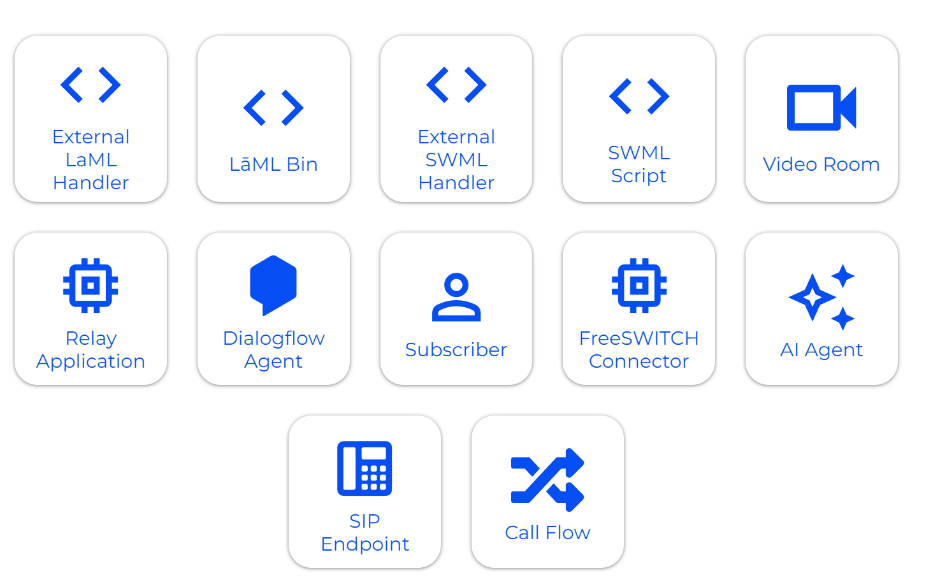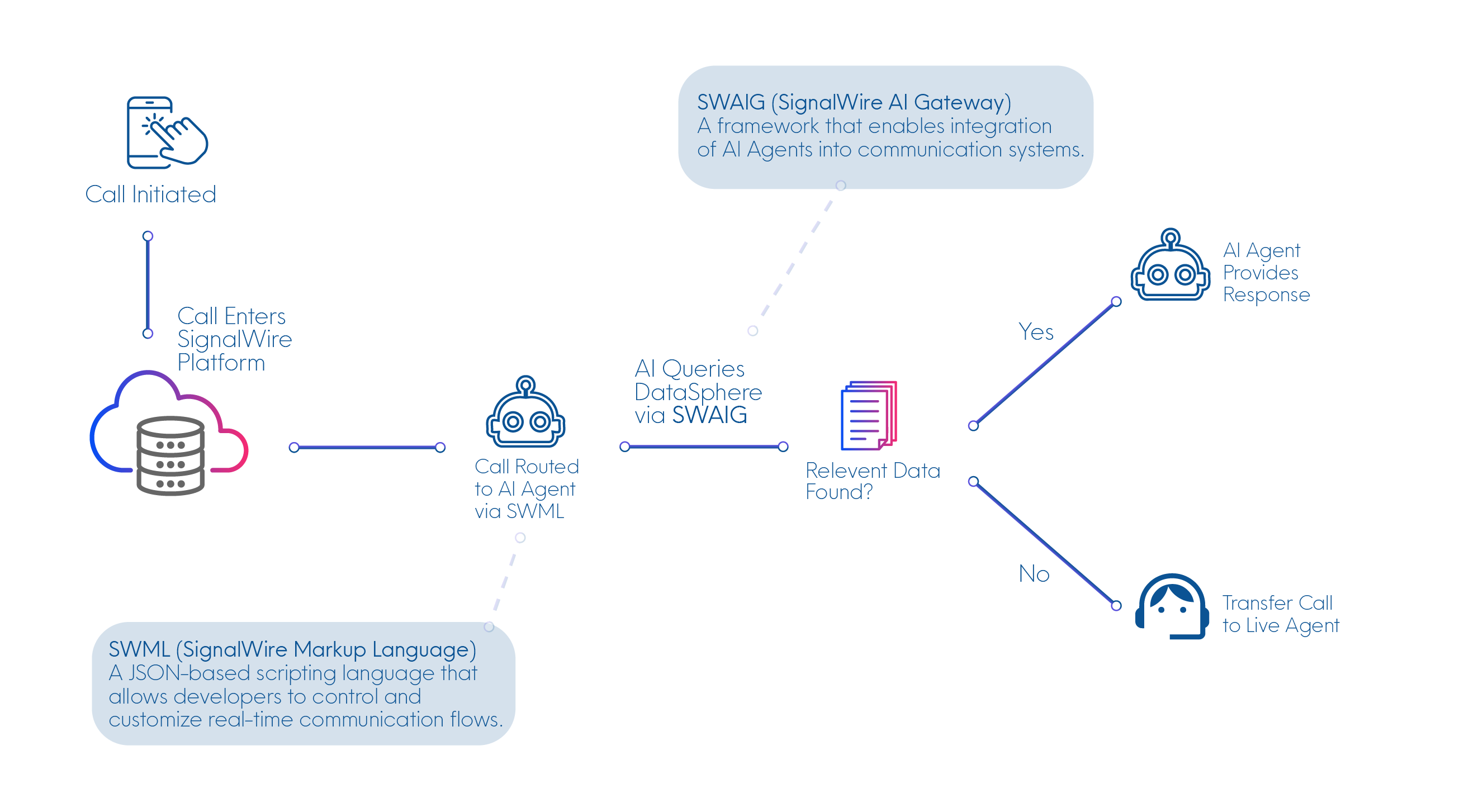AI voice agents help teams automate customer support, scheduling, and high-volume contact center interactions, but deploying them in production requires reliable call control, real-time data access, and a developer-friendly operating model. This post explains how SignalWire deploys AI voice agents on Call Fabric, including practical use cases, developer tools like SignalWire Markup Language (SWML) and SignalWire AI Gateway (SWAIG), and how Datasphere supports Retrieval-Augmented Generation (RAG) so agents can answer from a controlled knowledge base instead of guessing.
Building Better Voice AI
According to 83% of consumers, good customer service can turn one-time buyers into long-term customers. Meanwhile, more than one negative experience will lead 80% of consumers to do business with a competitor. As customer expectations evolve, AI voice agents can help you improve your support operations and stay ahead of the competition.
SignalWire's recent LiveWIRE webinar showcases the ease and effectiveness of deploying AI voice agents, with examples to show you how you can start building scalable AI-powered customer service. This session covers everything you need to know about leveraging SignalWire’s platform to bring AI communications to life.
Building on Call Fabric
SignalWire delivers a category-defining approach called Programmable Unified Communications (PUC). This developer-centric, flexible concept brings together scalable communication infrastructure that blends the best of CCaaS, CPaaS, and UCaaS.
SignalWire’s Call Fabric platform supports the deployment of advanced AI agents, ensuring secure, reliable, and high-performance interactions. Call Fabric breaks down primitives into easy-to-use building blocks called resources, allowing you to build custom communications solutions without having to figure out complicated backend infrastructure.
The future of AI voice
Businesses are adopting AI across industries to drive innovation, and the growing list of AI offerings is seemingly endless. AI voice agents offer a fast, easy, and cost-effective way to bring automation to customer service, sales, and support by reducing workloads for human agents.
With nearly 80% of customer service expected to rely on generative AI in some form by 2025, investing in AI voice solutions is one practical way to stay competitive and make sure you’re meeting customer needs.
Practical use cases for AI voice agents
24/7 automated customer self service
Today’s AI voice agents can manage up to 90% of routine inquiries, providing accurate responses that free up human agents to deal with more complex issues. These AI voice assistants can offer customers access to basic troubleshooting, order tracking, and other general business information.
SignalWire’s AI agents simplify the customer journey, increasing satisfaction by cutting down response times. For customers calling outside business hours, self-service options are a practical option for 24/7 support that might not otherwise be financially feasible.
AI-powered appointment scheduling
SignalWire’s AI agents are masters of scheduling, ideal for managing appointments, handling bookings, and sending reminders. Appointment reminders have been shown to drastically reduce no-shows, a major advantage in industries where timely attendance is critical and money is lost when appointments are missed.
Sales and customer insights
AI voice agents provide valuable insights into customer behavior, helping sales teams make informed decisions. According to a report by HubSpot, sales professionals save an average of 2 hours and 15 minutes daily by automating repetitive tasks, and 65% of sales professionals report that AI improves their understanding of customer needs. 61% of these sales reps say AI has made prospecting more personalized, improving connection rates and driving revenue.
Contact centers and CCaaS solutions
In contact centers and CCaaS environments, AI agents are essential for handling high call volumes, managing customer interactions, and providing 24/7 service. With AI agents, contact centers benefit from reliable data collection, consistent customer experience, and personalized service. SignalWire’s AI agents provide call routing, real-time data access, and can perform actions like sending text messages or scheduling appointments, reducing agent workload.
Developer-friendly tools for AI implementation
SignalWire’s developer tools make deploying AI easy and efficient, with support for secure, scalable, and highly reliable solutions that cover over 5 billion people worldwide.
SignalWire markup language (SWML) simplifies the coding process for developers, allowing rapid deployment of AI voice agents with minimal error. SWML is designed to ensure smooth workflows, helping developers deploy reliable solutions without extensive debugging or manual coding.
SignalWire AI gateway (SWAIG) connects AI agents with third-party APIs, allowing developers to integrate CRMs, databases, and appointment scheduling software. SWAIG also helps agents fetch external data in real-time, making it easier to access customer details and other key information.
SignalWire Datasphere is a powerful retrieval-augmented generation (RAG) API that gives AI agents access to specialized, custom knowledge bases. This allows AI agents to retrieve data from company-specific sources rather than public databases and makes AI interactions more reliable and secure, reducing the risk of hallucinations and increasing accuracy by 30%.
AI agent demos
Kevin the AI Bartender uses the Datasphere API to provide drink recipes. This demo shows how AI voice assistants can draw on a custom knowledge base, ensuring responses are accurate and tailored to customer needs. The AI will not discuss anything outside of this specialized database.
Bobby’s Table is a restaurant reservation system that demonstrates how AI can handle appointment scheduling and respond to user inputs creatively. This solution illustrates the ease of building AI solutions with SignalWire’s AI agents.
Brian West, SignalWire's Director of Support Engineering, also demonstrated an advanced use case by connecting SignalWire’s AI agents with Zendesk’s API. With this integration, AI agents can manage support tickets, add comments, authenticate users by phone, all within SignalWire’s secure platform to simplify the support process.
Best practices for implementing AI voice agents
Implementing AI voice agents successfully requires some strategic planning. Here are our tips for a focused approach to AI integration:
Plan the agent’s functions: Outline each task your AI agent will handle, such as call routing, FAQ responses, or troubleshooting, to avoid redundancies and maximize efficiency.
Leverage metadata for context: Metadata stores vital information, allowing agents to access relevant details without exposing sensitive data. Metadata tokens can hold user session information or relevant case details that can be called on demand.
Use Datasphere for reliable interactions: Using the Datasphere API to create a specialized knowledge base ensures that responses are accurate, reducing the risk of hallucinations.
Monitor and optimize regularly: SignalWire’s developer tools allow for regular testing and optimization to maintain service. Monitor KPIs like response latency, customer satisfaction, and resolution rates to keep the AI’s behavior aligned with business objectives and customer expectations.
SignalWire’s AI voice agents offer a streamlined, cost-effective solution for organizations looking to enhance customer service, automate support tasks, and improve sales processes. With developer-friendly tools and robust AI functionalities, SignalWire makes it easy to build reliable, scalable AI applications tailored to unique business needs.
Ready to transform customer service operations? Start building today by signing up for a SignalWire Space and join our community! Our team and developer community can be found on Discord.
Frequently asked questions
What are AI voice agents used for in customer support?
AI voice agents are used to automate routine support requests, reduce wait times, and route callers to the right outcome, including self-service answers, ticket creation, or escalation to a human when needed.
What is SignalWire Call Fabric, and why does it matter for deploying AI voice agents?
SignalWire Call Fabric is the platform layer that provides programmable building blocks for real-time communications, letting teams deploy AI voice agents on top of managed voice infrastructure without building the backend telecom stack themselves.
What is SignalWire Markup Language (SWML) used for?
SignalWire Markup Language (SWML) is used to define call flows and agent behavior in a structured way so developers can deploy AI voice agents quickly and keep workflows predictable in production.
What is SignalWire AI Gateway (SWAIG) used for?
SignalWire AI Gateway (SWAIG) connects AI voice agents to external systems through Application Programming Interface (API) calls, for example Customer Relationship Management (CRM) tools, databases, or scheduling systems, so the agent can fetch or update information during a live interaction.
How does Retrieval-Augmented Generation (RAG) improve AI agent accuracy?
Retrieval-Augmented Generation (RAG) improves accuracy by grounding responses in a curated knowledge base. In this post, SignalWire Datasphere is described as a RAG API that gives agents access to company-specific sources so they can retrieve information instead of relying on general public data.




